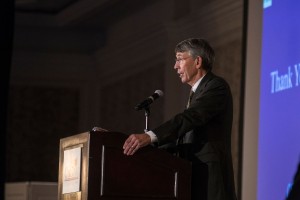
By Buzz McClain
George Mason University economist Stephen Fuller is set to present a comprehensive plan to policymakers and business leaders next month outlining how the region can increase economic growth and remain competitive in the coming decades.
The plan, developed by three area universities, notes that changes in government spending have created a new sense of urgency for the region, requiring more diverse job growth and less dependency on federal contracts and payrolls.
Over the next decade, the region should invest and create policies that develop other area industries, including advocacy, communications, technology, and education.
The report, titled “Roadmap for the Washington Region’s Economic Future,” was prepared by researchers at George Mason, American University, and the University of Maryland.
Fuller, senior advisor and director of special projects at Mason’s Center for Regional Analysis, served as the lead researcher on the project. He will present the plan at an economic conference on January 14 at the Tysons Corner Ritz-Carlton. The event is sponsored by Mason, Cardinal Bank, the Fairfax Chamber of Commerce, and the Washington Business Journal.
“The region needs to expand its economic pace,” Fuller said. Washington needs to generate “tens of thousands of new high-value jobs and replace the jobs lost due to federal spending cutbacks over the past five years.”
Business leaders cited a need for greater emphasis on education, so that they can find innovative and trained talent in the area.
Fuller said this creates an opportunity for the area’s 104 colleges and universities to expand their role in the region’s economy, and it positions Washington to be as well known for its colleges and universities as Boston, where higher education is a cottage industry.
“We have an enormous foundation of higher education and hardly anybody knows it,” Fuller said. “We could do a lot to put Washington on the map by promoting the network of schools in the region.”
The report also stresses the need for schools to broaden their educational model to better connect with the economy and workplace. This includes increasing the number of internships and externships, as well as lifelong learning opportunities.
“Mason and Northern Virginia Community College, among others, need to think about more nondegree programs and more flexible education for those over 30, 40, 50, and even 60 years old,” he said. “We need to keep people who are fully employed moving up the career ladder.”
After the January 14 conference, Fuller will spend the next year presenting the “Roadmap” across the region to help business and education leaders ramp up their efforts.
Register for the conference here.
